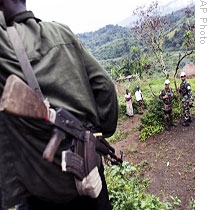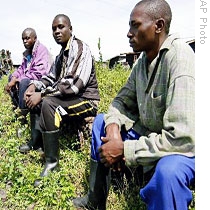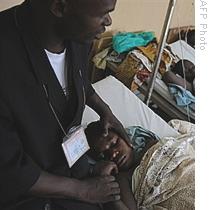London
13 October 2009
 |
| UN peacekeepers (R) pass a Rwandan Hutu rebel (L) as they patrol in FDLR rebel-held territory in eastern Congo (File) |
The coalition of 84 humanitarian and human rights groups says UN officials and diplomats have to do more to protect civilians in DRC.
Anneke Van Woudenberg, senior researcher at the Britain based aid group Human Rights Watch, says satellite imagery has been collected that shows widespread destruction of entire villages since the operation began.
"These satellite images are really hard hitting and show that village after village in eastern Congo has been completely destroyed. In many of these places not a single house is left standing," she said.
The Congolese government is fighting against a militia group from neighboring Rwanda, the Democratic Forces for the Liberation of Rwanda, or FDLR.
According to UN statistics, over 1,000 FDLR fighters have given up their arms and repatriated to Rwanda since the operation began in January.
 |
| 3 FDLR soldiers surrendering to the Congolese army are watched by Congolese soldiers near Goma, DRC (File) |
Van Woudenberg says much of the abuse is carried out by FDLR militia who are deliberately targeting civilians. But she says government troops are also guilty of violent attacks against civilians.
"Certainly soldiers of the Congolese army are committing widespread abuse," she said. "They are responsible for many of the rapes that are occurring in eastern Congo, they themselves are also burning villages and homes on a widespread basis and of course are carrying out looting which always happens during military operations," she added.
The United Nations peacekeeping mission in Congo, MONUC, has been backing the Congolese army in this military operation since March. UN peacekeepers provide tactical expertise, transport and aviation support, food rations, fuel and medical support to Congolese army soldiers. The cost to the UN is over $6 million.
Van Woudenberg says questions need to be answered about whether the UN should be supporting a military operation that has such high human costs.
"Should UN peacekeepers indeed be supporting what is clearly a very abusive military operation, a very abusive army and that is the question we are raising. We believe that UN peacekeepers have got to ensure that there are conditions on their support," she said.
Stephen Carter is an independent Africa specialist based in London. He says the United Nations is crucial to ousting FDLR fighters from eastern Congo.
 |
| Father Samuel (L) holds the hand and face of a rape victim as they pray moments after the young Congolese woman underwent surgery to repair physical damage suffered while being raped (File) |
He says without the support of the United Nations, the Congolese government may not be able to get the job done.
"They can't leave it up to the Congolese army on its own because the Congolese army is unlikely to be effective on past form against the FDLR," he explained. "And also, without any outside support we'll have, you know, very little restraint on the way it conducts its operations," he added.
He says one argument is that the United Nations should play a stronger role to ensure that the military operation is successful. But he says what the UN really needs to do is look at broader issues.
"I think actually the more interesting question is whether there is more that can be done in the wider picture to look at the underlying issues -- the forces of funding for the FDLR, their control over natural resources and mines in eastern DRC and also whether there are ways of negotiating an end to the conflict without having to defeat them militarily, which is very difficult," Carter said.
According to the Congo Advocacy Coalition, more than 1,000 civilians have been killed since the Kimia II military operation began. A further 7,000 women and children have been raped and more than 6,000 homes burned down.